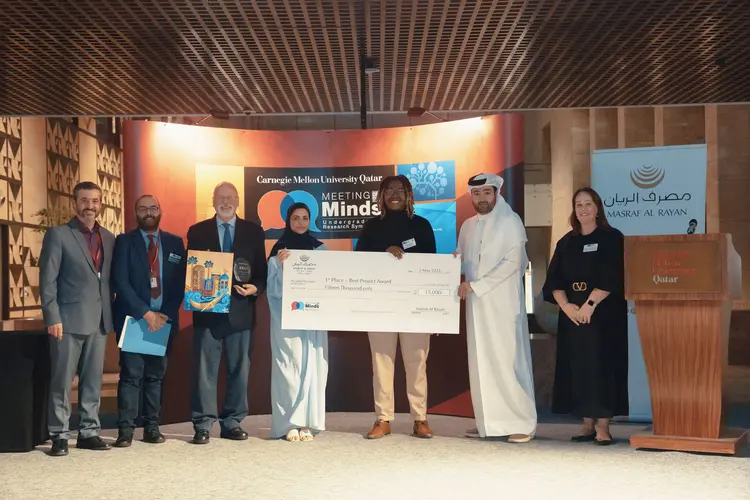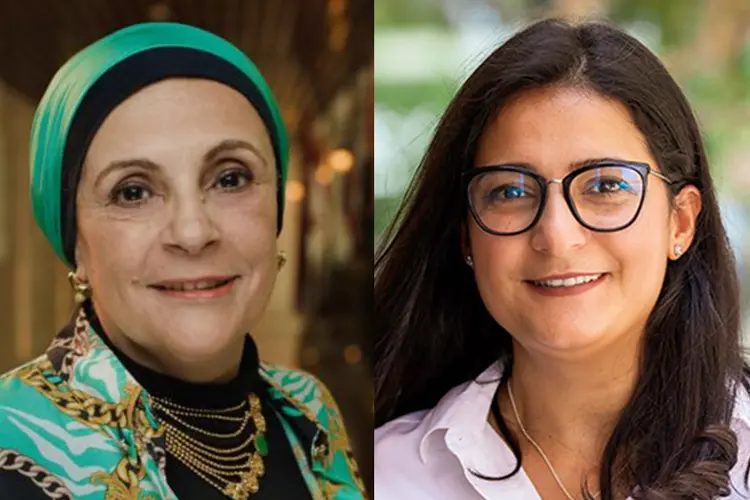
Carnegie Mellon Qatar Students Win Top Food Tech Idea for Printing Vegetables
Qatar Development Bank competition inspires new way to ensure food security
Media Inquiries
Two students at Carnegie Mellon University in Qatar(opens in new window) (CMU-Q), a Qatar Foundation partner university, won top prize in the food technology category at the Business Incubation and Acceleration Hackathon, hosted by Qatar Development Bank (QDB).
Mohammad Fadhel Annan and Lujain Al Mansoori created an idea for 3D-printed vegetables, an alternative to farming that could bolster food security in places like Qatar, where there is little arable land. They won 25,000 QAR (nearly $7,000) to invest in their idea.
The hackathon was designed to empower entrepreneurs in Qatar to share their ideas and creative solutions to address challenges in digital transformation across a variety of industries. The 2023 edition spanned the financial, food, sports and fashion technology industries and featured solutions on enabling customers’ experiences and operational solutions for digital transformation.
Michael Trick(opens in new window), dean of CMU-Q, was impressed by the ingenuity of Annan and Al Mansoori’s idea.
“We encourage our students at CMU-Q to apply the knowledge they learn here to create solutions that will have a big impact,” Trick said. “Congratulations to Mohammad and Lujain for such an innovative approach to food security.”
For the competition, Annan and Al Mansoori developed their idea to use a combination of artificially grown vegetable cells and UV-sensitive 3D printer ink to print vegetables. Their pitch included plans to modify 3D printers to accommodate biological matter and a prototype printed carrot.
Hamad Mejegheer, executive director of advisory and incubation at QDB, emphasized the importance of the competition, which “represents a continuation of our efforts to foster an entrepreneurial ecosystem that embraces innovators and pioneers who add value to our diversified and knowledge-based economy in line with the strategic objectives of the Qatar National Vision 2030.”
Both students are beginning their third year in information systems(opens in new window) at CMU-Q, and they intend to develop their idea as they continue their studies. Mohammed Al-Sadi(opens in new window), teaching assistant for information systems, served as a mentor on the project.
Annan has been working on the details of adapting 3D printer technology for the purpose of making food.
“We have spent a lot of time developing a computer-aided drafting (CAD) model for a specialized 3D printer that can use edible inks to print food products,” Annan said. “As each layer is printed, ultraviolet light solidifies the edible ink, and in the end you have a vegetable.”
Al Mansoori is optimistic about the possibilities for food production.
“We could potentially print food in bulk, greatly reducing the time and money it takes to grow fruits and vegetables. It’s limitless what we can do,” Al Mansoori said.
After their successful pitch at the QDB competition, the students have been offered a seat in QDB’s startup program, where they will have access to experts and mentors to guide their progress.
Carnegie Mellon University in Qatar offers undergraduate degree programs in four fields: biological sciences, business administration, computer science and information systems. Students are encouraged to work across disciplines to create projects that have a real-world impact.


